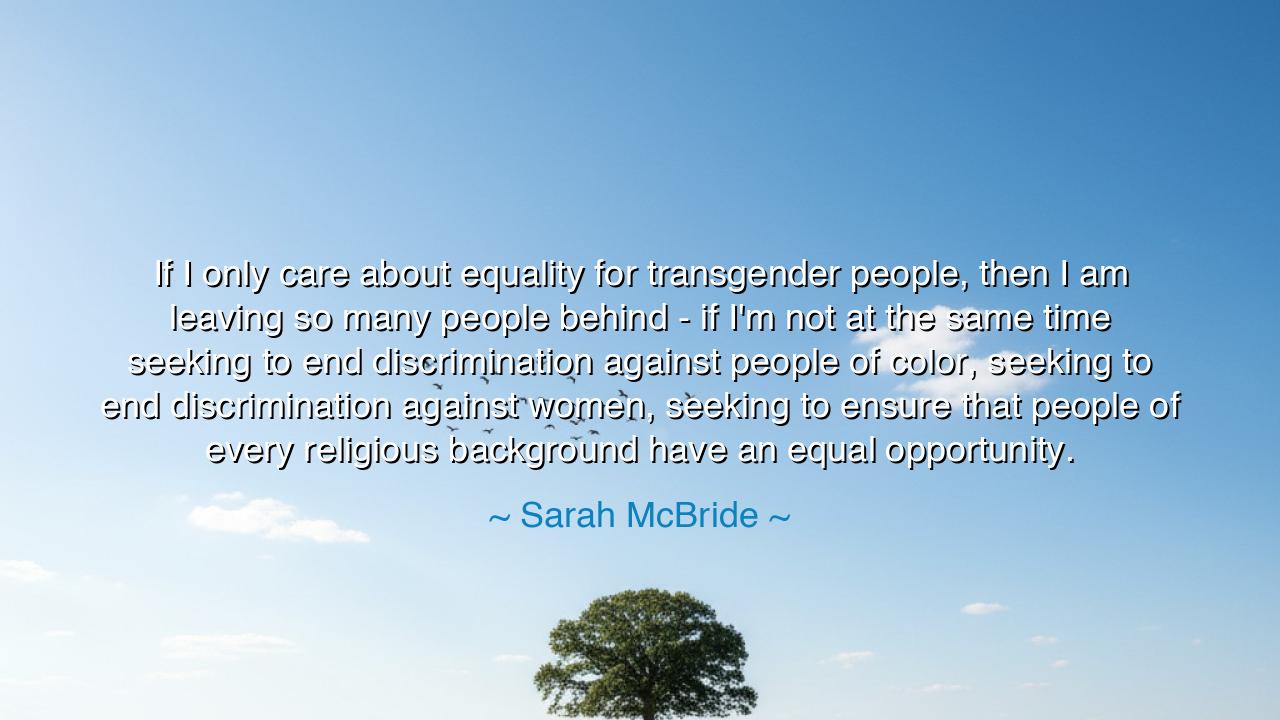
If I only care about equality for transgender people, then I am
If I only care about equality for transgender people, then I am leaving so many people behind - if I'm not at the same time seeking to end discrimination against people of color, seeking to end discrimination against women, seeking to ensure that people of every religious background have an equal opportunity.






"If I only care about equality for transgender people, then I am leaving so many people behind - if I'm not at the same time seeking to end discrimination against people of color, seeking to end discrimination against women, seeking to ensure that people of every religious background have an equal opportunity." These words from Sarah McBride embody a powerful truth: the fight for equality cannot be narrowed to one group alone. True justice and fairness are not selective; they demand a holistic approach that acknowledges and addresses the injustices faced by all marginalized groups. To focus on the rights of one while ignoring the struggles of others is to undermine the very essence of equality itself. McBride’s statement serves as a clarion call to those who fight for justice: if we are to truly create a society where every person is treated with dignity and respect, we must embrace the struggles of all, not just those that personally affect us.
In the ancient world, the concept of justice was often linked to the idea of balance and harmony within society. The great philosopher Plato proposed that a just society is one where each part plays its proper role, and all people receive what they are due. But even in these early philosophical frameworks, the justice Plato spoke of was often restricted to certain groups. Women, slaves, and non-citizens were excluded from full participation in the ideal society. It was only through the voices of reformers like Socrates and later, the Stoics, that the idea of universal equality began to take shape. They pushed against the confines of their time, calling for justice that was not limited by gender, class, or ethnicity. McBride’s words reflect this ancient ideal, recognizing that true equality requires the intersection of struggles, not the isolation of one cause over another.
Consider the historical example of Martin Luther King Jr., whose fight for racial equality did not exist in a vacuum. While his focus was on the oppression of Black Americans, his vision extended beyond race. King’s Letter from Birmingham Jail makes this clear as he writes that injustice anywhere is a threat to justice everywhere. King understood that the freedom of one was bound to the freedom of all. His was not a movement for racial equality alone, but for human dignity—a call for the end of oppression wherever it exists, whether against race, gender, or class. This spirit of interconnected struggle is precisely what McBride advocates for in her call to unite the fight for transgender rights with the fight for racial equality, women’s rights, and religious freedom.
Sarah McBride’s statement also challenges us to recognize that privilege and oppression are not singular or isolated experiences. People who are transgender may also be people of color, women, or members of marginalized religious groups. The fight for transgender equality cannot be separated from the broader struggle for racial justice, gender equity, and religious freedom. To do so would be to fail to see the interconnectedness of human experience. Consider the intersectionality described by Kimberlé Crenshaw, a scholar and civil rights advocate, who coined the term to describe how race, gender, class, and other factors intersect to shape the lives of marginalized people. McBride’s call for unity in the fight for justice reflects this deeply interconnected understanding of identity and struggle.
In modern history, we can see the power of this unified fight for equality through movements like Black Lives Matter. This movement, which started as a call for justice for Black lives, has expanded to include the struggles of other marginalized groups, including LGBTQ+ individuals, immigrants, and those fighting for economic justice. The movement’s power lies not just in its focus on one issue, but in its ability to unify disparate struggles under a common banner of justice. This idea is echoed in McBride’s vision—equality is not about picking one group to fight for but about lifting all voices and addressing the interwoven threads of oppression.
The lesson from Sarah McBride’s words is one of unity in the pursuit of justice. If we are to build a world of equality, we must recognize that the struggles of one group are inherently linked to the struggles of all others. Fighting for the rights of transgender people is not enough if we are not also fighting for racial equality, gender equity, and religious freedom. True justice is not piecemeal; it is holistic and requires that we stand together in solidarity across all divides. We must see the connections between struggles and unite in the shared pursuit of a world where every individual is treated with dignity, respect, and fairness.
So, future generations, remember this: equality is a vision that transcends individual causes and demands a collective effort. Just as the ancient philosophers pushed for justice beyond the limitations of their time, so must we strive for a world where all voices are heard, and all struggles are acknowledged. McBride’s wisdom teaches us that the fight for justice is not a matter of individual battles but a united march toward a world where freedom and dignity are the rights of all people, regardless of their identity. Let this be your call to action—to fight for justice not just for yourself, but for all who are oppressed, for in lifting others, we lift ourselves.






AAdministratorAdministrator
Welcome, honored guests. Please leave a comment, we will respond soon